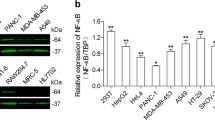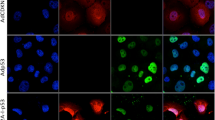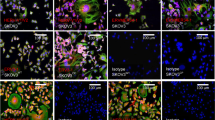Abstract
We recently showed that the human telomerase reverse transcriptase (hTERT) promoter induces tumor-specific Bax gene expression and selectively kills various human cancer cells both in vitro and in xenograft tumors. However, it remains unclear whether the hTERT promoter can be used to induce transgene expression in syngenic tumors in mice and whether Bax gene expression driven by the hTERT promoter will cause long-term, stem cell-related toxicity. To address these questions, we tested hTERT promoter-driven, adenovirus-mediated Bax transgene expression in an established syngenic mouse tumor model and its effects on tumor and normal murine tissues. The hTERT promoter was highly active in several murine tumor cell lines and a transformed cell line, but not in non-transformed and normal murine cell lines. The hTERT promoter induced tumor-specific Bax gene expression in mouse UV-2237m fibrosarcoma cells both in vitro and in vivo and suppressed syngenic tumor growth in immune-competent mice with no obvious acute or long-term toxic effects. Moreover, hTERT promoter-driven transgene expression in human CD34+ bone marrow progenitor cells had effects similar to those observed in other normal human cells, suggesting that the hTERT promoter is much less active in CD34+ cells than in tumor cells. Together, our data demonstrate that the hTERT promoter may allow the use of proapoptotic genes for cancer treatment without noticeable effects on progenitor cells.
This is a preview of subscription content, access via your institution
Access options
Subscribe to this journal
Receive 12 print issues and online access
$259.00 per year
only $21.58 per issue
Buy this article
- Purchase on Springer Link
- Instant access to full article PDF
Prices may be subject to local taxes which are calculated during checkout




Similar content being viewed by others
References
Thompson C.B. . Apoptosis in the pathogenesis and treatment of disease Science 1995 267: 1456 1456
Roth J.A. et al. Retrovirus-mediated wild-type p53 gene transfer to tumors of patients with lung cancer Nat Med 1996 1996: 2 2
Shinoura N. et al. Apoptosis by retrovirus- and adenovirus-mediated gene transfer of Fas ligand to glioma cells: implications for gene therapy Hum Gene Ther 1998 9: 1983 1983
Pataer A. et al. Adenoviral Bak overexpression mediates caspase-dependent tumor killing Cancer Res 2000 60: 788 788
Kagawa S. et al. Antitumor effect of adenovirus-mediated Bax gene transfer on p53-sensitive and p53-resistant cancer lines Cancer Res 2000 60: 1157 1157
Shinoura N. et al. Adenovirus-mediated transfer of caspase-8 augments cell death in gliomas: implication for gene therapy Hum Gene Ther 2000 11: 1123 1123
Vile R.G., Hart I.R. . In vitro and in vivo targeting of gene expression to melanoma cells Cancer Res 1993 53: 962 962
Osaki T. et al. Gene therapy for carcinoembryonic antigen-producing human lung cancer cells by cell type-specific expression of herpes simplex virus thymidine kinase gene Cancer Res 1994 54: 5258 5258
Chen L. et al. Breast cancer selective gene expression and therapy mediated by recombinant adenoviruses containing the DF3/MUC1 promoter J Clin Invest 1995 96: 2775 2775
Parr M.J. et al. Tumor-selective transgene expression in vivo mediated by an E2F-responsive adenoviral vector Nat Med 1997 3: 1145 1145
Gu J. et al. Tumor-specific transgene expression from the human telomerase reverse transcriptase promoter enables targeting of the therapeutic effects of the Bax gene to cancers Cancer Res 2000 60: 5359 5359
Koga S. et al. A novel telomerase-specific gene therapy: gene transfer of caspase-8 utilizing the human telomerase catalytic subunit gene promoter Hum Gene Ther 2000 11: 1397 1397
Kim N.W. et al. Specific association of human telomerase activity with immortal cells and cancer Science 1994 266: 2011 2011
Shay J.W., Bacchetti S. . A survey of telomerase activity in human cancer Eur J Cancer 33 1997: 787 787
Oreffo V.I. et al. Decreased expression of the adenomatous polyposis coli (Apc) and mutated in colorectal cancer (Mcc) genes in mouse lung neoplasia Mol Carcinog 1998 21: 37 37
Kagawa S. et al. A binary adenoviral vector system for expressing high levels of the proapoptotic gene bax Gene Therapy 2000 7: 75 75
Lu W., Fidle I.J., Dong Z. . Eradication of primary murine fibrosarcomas and induction of systemic immunity by adenovirus-mediated interferon β gene therapy Cancer Res 1999 59: 5202 5202
Watanabe T. et al. Gene transfer into human bone marrow hematopoietic cells mediated by adenovirus vectors Blood 1996 87: 5032 5032
Feldman E. et al. Adenovirus-mediated alpha interferon (IFN-α) gene transfer into CD34+ cells and CML mononuclear cells Stem Cells 1997 15: 386 386
Howard D.S. et al. Genetic manipulation of primitive leukemic and normal hematopoietic cells using a novel method of adenovirus-mediated gene transfer Leukemia 1999 13: 1608 1608
Greenberg R.A. et al. Telomerase reverse transcriptase gene is a direct target of c-Myc but is not functionally equivalent in cellular transformation Oncogene 1999 18: 1219 1219
Yin L., Hubbard A.K., Giardina C. . NF-κB regulates transcription of the mouse telomerase catalytic subunit J Biol Chem 2000 275: 36671 36671
Wang J. et al. Myc activates telomerase Gene Dev 1998 12: 1769 1769
Takakura M. et al. Cloning of human telomerase catalytic subunit (hTERT) gene promoter and identification of proximal core promoter sequences essential for transcriptional activation in immortalized and cancer cells Cancer Res 1999 59: 551 551
Horikawa I., Cable P.L., Afshari C., Barrett J.C. . Cloning and characterization of the promoter region of human telomerase reverse transcriptase gene Cancer Res 1999 59: 826 826
Kyo S. et al. Sp1 cooperates with c-Myc to activate transcription of the human telomerase reverse transcriptase gene (hTERT) Nucleic Acid Res 2000 28: 669 669
Tzukerman M. et al. Identification of a novel transcription factor binding element involved in the regulation by differentiation of the human telomerase (hTERT) promoter Mol Biol Cell 11 2000: 4381 4381
Morrison S.J., Prowse K.R., Ho P., Weissman I.L. . Telomerase activity in hematopoietic cells is associated with self-renewal potential Immunity 1996 5: 207 207
Yui J., Chiu C.-P., Lansdorp P.M. . Telomerase activity in candidate stem cells from fetal liver and adult bone marrow Blood 1998 91: 3255 3255
Zhang W. et al. Telomerase activity in human acute myelogenous leukemia: inhibition of telomerase activity by differentiation-inducing agents Clin Cancer Res 1996 2: 799 799
Andreeff M. et al. Expression of Bcl-2-related genes in normal and AML progenitors: changes induced by chemotherapy and retinoic acid Leukemia 1999 13: 1881 1881
Acknowledgements
We thank Teresa McQueen for isolating human bone marrow CD34+ cells, Dr Isaiah J Fidler for providing us with the UV-2237m murine tumor cells. This study was funded by a research project grant from the American Cancer Society (RPG-00-274-01-MGO to BF); an Institutional Start Up Fund grant (to BF); a development award from the WM Keck Center for Cancer Gene Therapy of The University of Texas MD Anderson Cancer Center (BF); an NIH program project grant (CA78778-01A1), and an NIH Core Grant for Medium and Vectors (CA 16672). JG is an MD Anderson Odyssey Program Fellow supported by the Kimberly-Clark Endowment for New and Innovative Research.
Author information
Authors and Affiliations
Rights and permissions
About this article
Cite this article
Gu, J., Andreeff, M., Roth, J. et al. hTERT promoter induces tumor-specific Bax gene expression and cell killing in syngenic mouse tumor model and prevents systemic toxicity. Gene Ther 9, 30–37 (2002). https://doi.org/10.1038/sj.gt.3301619
Received:
Accepted:
Published:
Issue Date:
DOI: https://doi.org/10.1038/sj.gt.3301619
Keywords
This article is cited by
-
Biological Ablation of Sentinel Lymph Node Metastasis in Submucosally Invaded Early Gastrointestinal Cancer
Molecular Therapy (2015)
-
Exploiting the Intron-splicing Mechanism of Insect Cells to Produce Viral Vectors Harboring Toxic Genes for Suicide Gene Therapy
Molecular Therapy - Nucleic Acids (2012)
-
Targeting different types of human meningioma and glioma cells using a novel adenoviral vector expressing GFP-TRAIL fusion protein from hTERT promoter
Cancer Cell International (2011)
-
Gene therapy with tumor-specific promoter mediated suicide gene plus IL-12 gene enhanced tumor inhibition and prolonged host survival in a murine model of Lewis lung carcinoma
Journal of Translational Medicine (2011)
-
Deletion analysis of Ad5 E1a transcriptional control region: impact on tumor-selective expression of E1a and E1b
Cancer Gene Therapy (2011)



